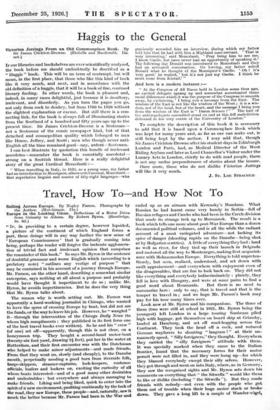Haggis to the General IF our libraries and bookshelves are
ever scientifically analysed, the book before me should undoubtedly be described as a " Haggis " book. This will be no term of contempt, but will mean, in the first place, that those who like this kind of book like it very much, and next, and in accordance with the old definition of a haggis, that it will be a book of fine, confused
literary feeding. In other words, the book is pleasant and, indeed, in many cases delightful, just because it is desultory, irrelevant, and disorderly. As you turn the pages you go, not only from cock to donkey, but from 1780 to 1926 without the slightest explanation or excuse. But still there is a con- necting link, for the book is always full of illuminating stories from the Scotland of a hundred and fifty years ago up to the present time. Sir James Crichton-Browne is a Scotsman— not a Scotsman of the comic newspaper kind, but of that detached and cosmopolitan quality which belonged to men like Hume, Jeffrey, and Scott ; men who though never anti- English all the time remained good—nay, ardent—Scotsmen.
I can best illustrate by quotation this bundle of irrelevant anecdotes—remember the book is essentially anecdotal— strung on a Scottish thread. Here is a really delightful story of the great Cardinal Mezzofanti :—
" When travelling in Italy, in 1835, as a young man, my father had an introduction to Monsignor, afterwards Cardinal, Mezzofanti- that superlative linguist and master of fifty-eight languages—who graciously accorded him an interview, during which my father told him that he had with him a Highland man-servant. That is very interesting,' said Mezzofanti. ' Pray bring him to see me. I know Gaelic, but have never had an opportunity of speaking it.' The following day Donald was introduced to Mezzofanti and they had an animated conversation. On leaving, my father asked Donald what he thought of the Monsignor's Gaelic. ' Oh it's very good,' he replied, but it's not just my Gaelic. I think he must come from liintaiL' "
And here is a modern instance :-
" At the Congress of All Races held in London some time ago, an excited delegate sprang up and somewhat accentuated those racial differences which it was the purpose of the Congress to smooth away, by exclaiming,' I bring you a message from the East.. The wisdom of the East is not like the wisdom of the West ; it is a wis- dom, not of the head, but of the heart, and the message I bring you. from the wisdom of the East is " Damn Science / " ' The hair of the anthropologists assembled stood on end at this fell malediction delivered in the very centre of tho University of London."
To complete the description of this book it is necessary to add that it is based upon a Commonplace Book which was kept for many years and, as far as one can make out, is still being kept by the author. I may add that, though Sir James Crichton-Browne after his student days in Edinburgh London and Paris, had, as Medical Director of the West Riding Asylum and later as Lord Chancellor's Visitor under the Lunacy Acts in London, chiefly to do with mad people, there is not any undue preponderance of stories about the insane.
J. Sr. LOE STRACHEY.


































 Previous page
Previous page